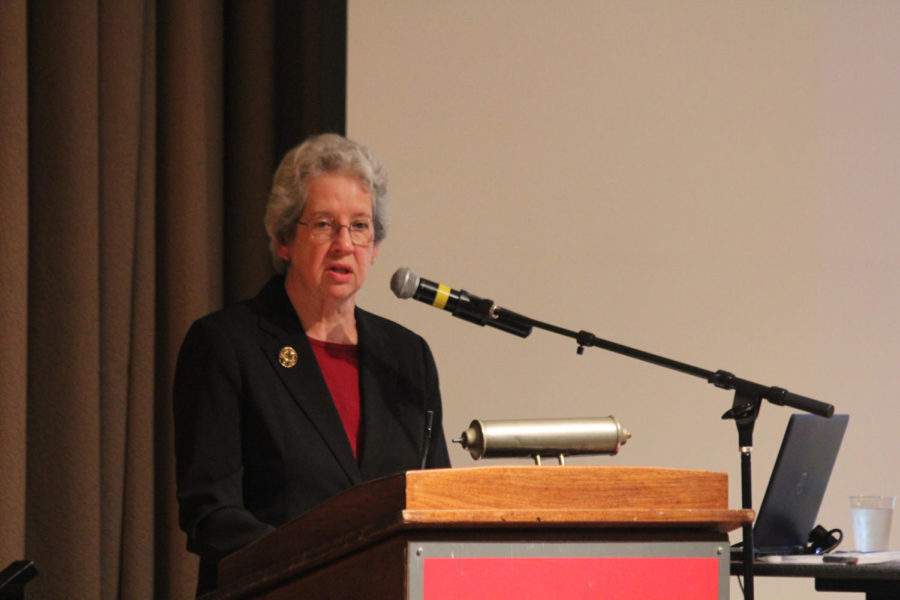Clifford gives King-inspired lecture on racism and catholic teaching
Anne Clifford speaks to students and staff at the Memorial Union on Sept. 27. Clifford presented the perspectives of both the Catholic and Islamic religion on various topics.
November 6, 2017
Anne Clifford, associate professor of philosophy and religious studies, told her audience during her lecture Monday evening in the Sun Room of the Memorial Union to fasten their seat belts and they all were taking a trip back in time.
The destination was back to the time when Martin Luther King Jr. led the civil rights movement through sit-ins, kneel-ins and peaceful marches in the American south.
Clifford said in anticipation of the 55 year anniversary of King’s “I Have a Dream” speech, which took place August 28, 1963 in Washington, she decided to give the lecture on racial equality and Catholic teaching.
“It is clear that Dr. Martin Luther King’s dream for a truly egalitarian America remains elusive,” Clifford said.
Clifford said King’s words and efforts are consistent with the founding principles of the United States, in particular the Declaration of Independence.
“Fifty-five years ago these so called amicable rights were denied [to] persons of African descent by law in southern American states,” Clifford said.
Clifford said King bravely addressed injustice and dared Americans to dream that founding principles would become a reality for all.
Clifford said King’s dream, quoting poet Langston Hughes, is a dream that continues to be deferred.
Clifford said race motivated the murders of nine African-American churchgoers at the Emanuel African Methodist Episcopal Church in Charleston, South Carolina in June of 2015. The day still haunts her.
“The many tragic deaths of African-Americans makes Dr. King’s message worthy of consideration today,” Clifford said.
Clifford outlined a few highlights of King’s life, including his imprisonment in the Birmingham jail following peaceful marches in Birmingham, Alabama in 1963, his leadership helping the passage of the Civil Rights Act in 1964 and King’s Nobel Peace Prize awarded at the young age of 35.
Clifford said the reason why King stayed a major leader in the civil rights movement until his death in 1968 was because he provided inspiration to the group.
“A quality evident of Dr. King’s life choices, whether planning [a] protest march in Alabama or a major event in Washington, D.C., was inclusive solidarity,” Clifford said.
Clifford said inclusive solidarity was important to King because his value of the Christian belief that all individuals are created in the likeness of God.
“King brought together prayer and advocacy,” Clifford said.
Clifford said Pope Francis mentioned King and his “I Have a Dream” speech in his speech to the U.S. Congress during his trip to the United States in 2015.
The “I Have a Dream” speech was a part of the 1963 event King helped organize as a peaceful march for more jobs and freedom in Washington.
Following the march, on the steps of the Lincoln Memorial, King addressed an estimated 250,000 people, giving what Clifford called a short and powerful speech.
Clifford said King’s words still are relevant today because they cast a light on white privilege.
“King offers a needed correct[ion] for white privilege, emphasizing human solidarity through mutual listening of life stories of the racial other,” Clifford said.
Clifford said the United Catholic bishops did not respond to racism during King’s time as a group, but individually.
The bishops finally did address racism in a letter entitled “Brothers and Sisters to Us” in 1979.
In the letter, the bishops called racism a sin that divides the human family and blocks out the image of God among specific members.
During the time the letter was released, Clifford said she was living in a predominantly African-American neighborhood in Pittsburgh. She spoke of her enthusiasm about the letter to African-American female Catholics.
Clifford said some of the females were excited because the letter addresses racism as a sin, but she remembered how one female was not pleased about the letter.
Clifford said the woman questioned the letter because she felt some of the statements within the letter did not state the experiences she had as an African-American woman, questioning if the letter was for all African-Americans.
“She was trying to figure out who the ‘all’ of us might be,” Clifford said. “She did not feel it was herself or most of the women gathered there.”
In 1984, a second letter was released by African-American bishops entitled “What We Have Seen and Heard.” The letter repeated the call for reconciliation, which is stated to be necessary for solidarity.
A third letter was released in 1989 by African-American bishops entitled “Reconciled Through Christ.” This letter encouraged African-American Catholics to reach out in solidarity to the broader society, especially among the growing Hispanic population at the time.
Clifford said it would be her dream to have updated letters released by the Catholic bishops with concrete plans to tackle racism.
“If you have not loved, all of these mean absolutely nothing,” Clifford said quoting King.







